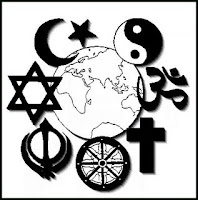Many of today’s religions demand that its followers subscribe to an established tradition and belief system. Should a member raise questions or fail to meet the necessary membership requirements he or she could be quickly admonished, silenced, branded a heretic or even excommunicated. Followers are therefore encouraged to avoid speaking out publically so as not to cause possible ‘embarrassment’ or ‘shame’ to the community. History is full of painful examples of what happens to those who disagree within a religious establishment. To give the reader a better understanding of what I am trying to explain, allow me to ask one simple question: has anyone ever been condemned for liking or disliking a particular piece of music? To appreciate a piece of music must I subscribe to a particular and preset order of definitions under which I must like that music? If I like Mozart and my best friend likes Jazz should we stop getting together? If I experience God most acutely through nature and my partner finds God easier through inspirational text should we divorce? Perhaps this analogy is a little too simple, but on the other hand why are our differing understandings so important when it comes to religion? Has it to do with our understanding of God or has it to do with our understanding of religion?
Some religious leaders see their primary role as enforcers of religious purity. These individuals are so bent on protecting and imposing their established tradition and belief system that no other views may be explored or discussed. In fact, some church leaders recently openly denied some members access to communion in the interest of “unity within the church”. For me this just doesn’t fit the model presented by Jesus himself.
If “communion implies unity with the church” then Jesus too would have to be excluded from the Catholic Church. Jesus clearly broke with established Tradition again and again as is evidenced throughout the Gospel stories. Have I been mistaken in believing that Jesus came to unite people regardless of race, colour or creed? Was I wrong in thinking that Jesus is more concerned with our hearts than what is dictated by man? Am I in error to believe that Jesus would deny himself to me if I don’t subscribe to apostolic succession, forced celibacy, non acceptance of female clergy and gay or married priests, etc.? Should I refrain from communion because I do not practice birth control, believe that condoms are a viable option for those stricken and/or exposed to aids and living in poverty in Africa? Should I avoid communion because my heart does not always agree with the dictates of the Church? Must I be denied communion because I pose questions that may be contrary to Tradition, dogma or doctrine?
I often wonder what our Saints think about institutional religion especially those who tried to bring change to the church but were condemned, jailed or excommunicated by the same church that later made them Saints. Similarly I think about the apostles and their immediate followers who did not have access to a church, were not exposed to any dogma or doctrine, yet they did not always agree with one another – did Jesus refuse his presence to them also?
Do we truly believe that for Jesus the word ‘unity’ meant conformity? Unity to me means ‘bringing together through diversity’! The world's religious institutions need to learn the true meaning of ecumenism and trust in the mystery of our unknowable and indefinable God!

No comments:
Post a Comment